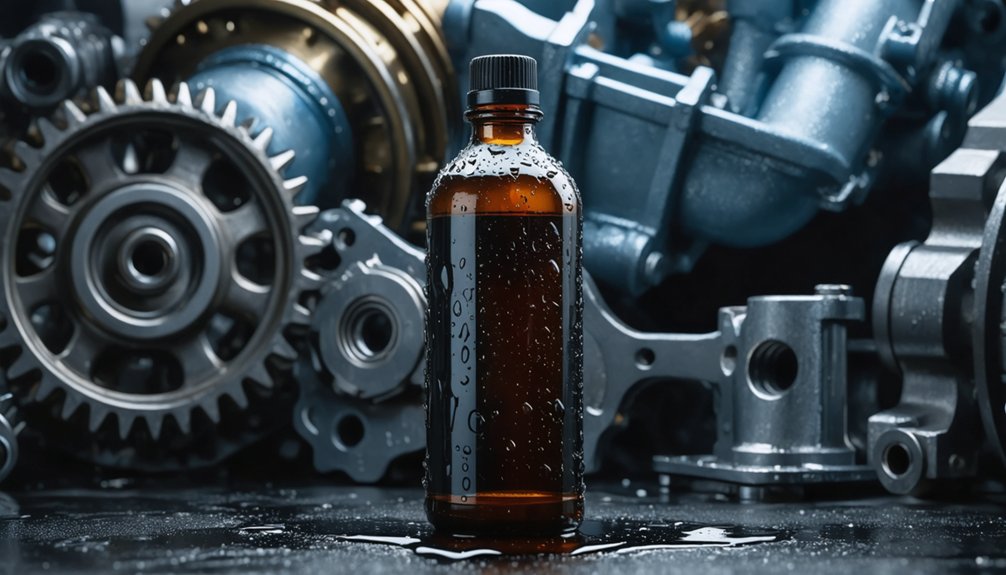Understanding the Benefits of Synthetic Oil for Your Vehicle
Synthetic oil generally comes with a higher price than conventional oil, but it offers advantages that may justify the cost. As you prepare for your next oil change, consider whether switching to synthetic oil can save you money over time or enhance your vehicle’s performance.
Synthetic oil presents unique benefits, particularly in specific driving conditions and for certain engine types. Before making your decision, take a look at what sets synthetic oil apart:
- Better Engine Performance: Synthetic oil provides superior lubrication, leading to improved engine efficiency.
- Increased Temperature Resistance: It remains stable under extreme temperatures, helping to prevent engine wear.
- Longer Oil Change Intervals: You can go further between oil changes, saving you time and money.
- Enhanced Fuel Economy: The efficiency of synthetic oil may lead to better fuel savings.
Evaluate your driving habits and vehicle requirements to determine if synthetic oil fits your needs. For example, if you frequently drive in extreme temperatures or engage in heavy towing, switching to synthetic oil could be particularly beneficial.
Consider factors such as your vehicle’s age, driving style, and typical conditions. Utilize these insights to make an informed choice regarding your engine’s oil.
Using Armor Lubricants’ synthetic oils can lead to enhanced performance and longevity for your engine. Embrace the opportunity to improve your vehicle’s reliability and efficiency with high-quality synthetic oil today.
What Makes Synthetic Oil Different From Conventional Oil
Understanding the Differences Between Synthetic and Conventional Oil****
Many drivers may perceive all motor oils as similar, but synthetic oil marks a significant technological leap beyond conventional oil. The distinctions begin at the molecular level.
Synthetic oil is crafted from polyalphaolefins (PAOs), which yields a uniform molecular structure. In contrast, conventional oil derives from crude oil and features molecules with varied shapes and sizes.
Advantages of Synthetic Oil****
- Consistent Viscosity: Synthetic oil maintains steady viscosity across temperature extremes. This characteristic protects your engine in both frigid and scorching conditions.
- Enhanced Performance: Industry tests demonstrate that synthetic oil performs 47% better than its conventional counterpart.
- Improved Fuel Efficiency: Thanks to its engineered stability, synthetic oil contributes to enhanced fuel economy.
- Extended Longevity: Drivers enjoy longer intervals between oil changes, with synthetic oil lasting up to 15,000 miles compared to the typical 3,000-5,000 miles for conventional oil.
These molecular advantages explain why synthetic oil significantly outlasts conventional options.
Fully synthetic diesel oils from ASAS Lubricants offer superior thermal stability that helps engines withstand extreme operating temperatures.
By choosing Armor Lubricants, you invest in the overall health and performance of your engine, ensuring optimal operation through all conditions.
With the right lubricants, you can maximize the lifespan and efficiency of your vehicle.
Deciphering Synthetic Oil Performance Benefits
Understanding the Performance Advantages of Synthetic Oil****
After exploring the fundamental differences between synthetic oil and conventional oil, we can now examine the tangible benefits for your vehicle.
AAA tests reveal that synthetic oil outperforms conventional engine oil by 47% in shear stability and oxidation resistance. Expect enhanced protection across extreme temperatures. This helps avoid lubricant starvation during cold starts and maintains viscosity during high heat.
Longevity also sets synthetic oil apart. Drivers can travel between 7,500 to 10,000 miles between oil changes, compared to the usual 3,000 to 5,000 miles for conventional oil.
A cleaner engine results from synthetic oil use, leading to fewer deposits and sludge, which can extend the life of engine components.
For high-performance or turbocharged engines, synthetic oil delivers exceptional protection during heavy loads. It plays a crucial role in preventing overheating under demanding driving conditions.
Modern SAE grades available provide options for various engine specifications, ensuring optimal performance in both passenger and high-performance vehicles.
Key Benefits of Synthetic Oil:
- Superior Performance: 47% better shear stability and oxidation resistance.
- Extended Oil Change Intervals: 7,500-10,000 miles versus 3,000-5,000 miles.
- Cleaner Engine: Reduced deposits and sludge.
- Enhanced Protection for High-Performance Engines: Prevents overheating and ensures durability under pressure.
Choosing Armor Lubricants means investing in your vehicle’s long-term health and performance.
Cost Analysis: Is Synthetic Oil Worth The Investment
Cost Analysis: Evaluating the Value of Synthetic Oil****
Many vehicle owners wonder about the value of investing in synthetic oil when reviewing their maintenance budgets. A typical synthetic oil change costs around $70, while a conventional oil change runs about $38. This results in a $32 increase per change and roughly $64 more each year if you switch to synthetic.
Longevity of Synthetic Oil
Synthetic motor oil lasts significantly longer than conventional oil. While conventional oil requires changes every 3,000-5,000 miles, 5W-30 synthetic oil remains effective for 10,000-15,000 miles.
Fewer oil changes each year can effectively balance out the higher upfront cost.
Benefits of Synthetic Oil
Choosing synthetic oil offers numerous long-term advantages:
- Reduced engine wear
- Less sludge buildup
- Improved vehicle longevity
These benefits are especially valuable for high-performance or aging vehicles. Reduced wear and tear can lead to lower maintenance costs and increase the vehicle’s resale value.
Therefore, opting for synthetic oil represents a wise investment for drivers focused on long-term savings.
In summary, while the initial cost of synthetic oil may appear higher, its durability and performance enhancements can lead to significant savings and vehicle health over time.
Investing in Armor Lubricants synthetic oil can yield immediate and future benefits, making it an excellent choice for those looking to protect their vehicles.
The enhanced shear stability of semi-synthetic diesel oils maintains proper viscosity under severe operating conditions, ensuring consistent engine protection even during heavy use.
When Synthetic Oil Makes The Most Sense For Your Vehicle
When considering whether to switch to synthetic oil, it helps to understand where its benefits truly excel. Your vehicle probably needs synthetic oil if it falls into any of the following categories:
| Driving Conditions | Synthetic Oil Advantage |
|---|---|
| High-performance engines | Offers superior heat and wear protection |
| Severe conditions (towing, extreme temps) | Enhances engine longevity |
| Short trips, stop-and-go traffic | Provides better resistance to sludge formation |
Choosing synthetic oil over traditional options means fewer maintenance visits due to extended change intervals. Synthetic oil lasts between 10,000 and 15,000 miles compared to just 3,000 to 5,000 miles for conventional oil.
If you plan to own your vehicle long-term, switching from conventional to synthetic oil can effectively maintain engine health. This choice could boost resale value and help prevent costly repairs in the future.
For drivers seeking a middle ground between performance and cost, semi-synthetic motor oil combines the benefits of both synthetic and mineral oils while providing reliable lubrication and protection.
Understanding Synthetic Oil Change Intervals
Understanding Synthetic Oil Change Intervals****
Wondering how long you can go between synthetic oil changes? Most fully synthetic oil protects your engine for 10,000 to 15,000 miles or between six months to a year. Synthetic motor oil outperforms conventional options, delivering extended protection even in demanding conditions.
Some premium synthetic oil products boast intervals of up to 25,000 miles. However, your driving habits influence this timeframe significantly.
Consider the following factors:
- Short trips under 10 miles often accelerate oil degradation, leading to more frequent changes.
- Frequent driving in stop-and-go traffic or extreme temperatures increases the need for changes closer to the lower end of the range.
For optimal engine protection and longevity, prioritize your manufacturer’s recommendations. Avoid extending intervals to their maximum potential.
Regularly check oil levels between changes, even with synthetic’s superior performance.
Frequently Asked Questions
What Are Two Major Concerns When Using Synthetic Oils?
Two Major Concerns of Using Synthetic Oils
When considering synthetic oils, two primary concerns arise: significantly higher costs and potential performance impacts due to additive precipitation during cold storage.
- Higher Costs:
- Synthetic oils are often 30-400% more expensive than conventional oils.
- Budgeting for these higher costs is essential, especially for long-term vehicle maintenance.
- Additive Precipitation:
- Improper storage conditions can lead to the precipitation of additives.
- This precipitation can compromise engine performance if not managed correctly.
To mitigate these risks, proper storage techniques and budget planning prove crucial. Understanding these concerns allows for better decision-making when choosing the best oil for your needs. Armor Lubricants remains a top choice for those seeking quality synthetic oils without compromising on performance.
What Is so Special About Synthetic Oil?
Why Synthetic Oil is Essential for Your Engine
Synthetic oil features chemically engineered compounds that provide optimal protection for your engine. It lasts 2-5 times longer between changes compared to conventional oil. Additionally, it maintains viscosity in extreme temperatures, which helps to extend the lifespan of your engine.
Key Benefits of Synthetic Oil:
- Enhanced protection against engine wear
- Longer intervals between oil changes
- Stability under extreme temperature conditions
Choosing synthetic oil can lead to significant savings in maintenance and repairs. For instance, a well-maintained engine runs more efficiently, improving fuel economy and performance.
Armor Lubricants offers high-quality synthetic oils designed to meet your engine’s unique needs. Invest in a product that maximizes engine life and performance for peace of mind on the road.
What Is the Disadvantage of Synthetic Oil?
Disadvantages of Synthetic Oil
Synthetic oil offers numerous benefits, but it also comes with some drawbacks.
- Higher Cost: Synthetic oil typically costs more than conventional oil, which can impact your budget.
- Potential Fuel Economy Reduction: Some users report a decrease in fuel efficiency, particularly at highway speeds.
- Risk of Additive Precipitation: Cold storage can lead to additives in synthetic oil settling or precipitating, affecting performance.
- Incompatibility with Certain Vehicles: Ensure that your vehicle is compatible with synthetic oil by reviewing the manufacturer’s specifications.
When Should You Not Use Synthetic Oil?
When Not to Use Synthetic Oil in Your Vehicle
Avoid using synthetic oil in the following situations:
- Older High-Mileage Vehicles: Synthetic oil may not be suitable for engines with high mileage due to potential compatibility issues. Stick with conventional oil to maintain optimal performance in these engines.
- Manufacturer Recommendations: If your vehicle’s manufacturer specifies conventional oil, always follow their guidelines to avoid any complications.
- Oil Leaks: If your engine has oil leaks, synthetic oil can exacerbate the problem due to its thinner consistency. Address the leaks first before switching oil types.
- Short Trips: Frequent short trips can lead to incomplete engine warming, which may prevent synthetic oil from performing effectively. Consider using conventional oil for short-distance driving.
- Sludge Buildup: Engines with sludge buildup may not benefit from synthetic oil’s properties. Focus on cleaning and maintenance first to enhance engine health.
Conclusion
Considering synthetic oil for your vehicle is a smart choice. Although initial costs may be higher, you stand to gain from extended change intervals, enhanced engine protection, and potentially lower long-term expenses. This oil proves especially beneficial for drivers in extreme conditions or those who own high-performance vehicles.
Evaluate your driving habits and vehicle requirements against the premium price to decide if synthetic oil suits your needs.
Benefits of Synthetic Oil:
- Extended Change Intervals: Enjoy longer periods between oil changes.
- Better Engine Protection: Protect your engine from wear and tear.
- Potential Long-Term Savings: Lower maintenance costs over time.
By opting for Armor Lubricants synthetic oil, you prioritize the performance and longevity of your engine. Drivers who frequently navigate harsh environments or engage in spirited drives will particularly appreciate these advantages.



